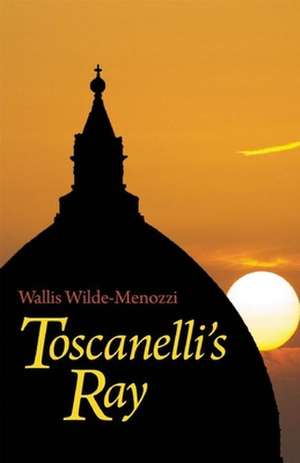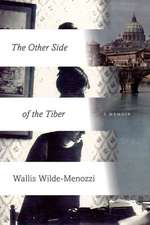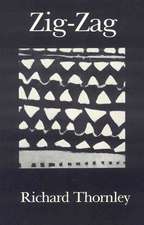Toscanelli's Ray
Autor Wallis Wilde-Menozzien Limba Engleză Paperback – 22 apr 2013
Preț: 103.08 lei
Nou
Puncte Express: 155
Preț estimativ în valută:
19.72€ • 20.64$ • 16.39£
19.72€ • 20.64$ • 16.39£
Carte disponibilă
Livrare economică 12-26 martie
Preluare comenzi: 021 569.72.76
Specificații
ISBN-13: 9780932274748
ISBN-10: 0932274749
Pagini: 333
Dimensiuni: 137 x 213 x 25 mm
Greutate: 0.5 kg
Editura: Cadmus Editions
ISBN-10: 0932274749
Pagini: 333
Dimensiuni: 137 x 213 x 25 mm
Greutate: 0.5 kg
Editura: Cadmus Editions
Recenzii
Praise for Toscanelli's Ray:
"Toscanelli's Ray is a brave and wonderfully ambitious book, a meditation on memory, identity and history. It is both a love song to the city of Florence, its ancient beauty and tangled history, and a cleared-eyed examination of the cracks and fissures that the new millennium has thrust upon it. In the course of a single day, Wilde-Menozzi's remarkable characters (including a long-dead Etruscan woman) circle, engage, damage and heal each other in ways that never cease to surprise. This is a novel of big ideas, one that raises provocative questions about immigration, difference and culture---even our notion of time itself, and simultaneously it is a novel full of the stuff of life---passion, guilt, betrayal, politics, and marriage. A stunning accomplishment, and Wilde-Menozzi's generous heart and lucid intelligence illuminate each page."
---Kathleen Cambor, The Book of Mercy
"Wallis Wilde-Menozzi's stunning novel digs deep to unearth the new Italian mosaic: the Americans and Florentines are still here, alongside the Etruscans, but so are the Nigerians, and the Eastern Europeans. Can Florence rise again to spark a new renaissance? Her intricately woven narratives, tough and elegant, illuminate the afterlife of the humanist dream as only the best fiction can."
---Askold Melnyczuk, The House of Flowers
"Toscanelli's Ray is an epic tale set in Florence with its ancient glory, its new graffiti, its bourgeoise, expatriates and illegal immigrants. Through rich mosaic like fragments we glimpse the utter strangeness of our own live in the twenty-first century. Voices from the global south, lives lived at the edge, in penury, without papers force a new reckoning of what Europe might be. Wallis Wilde-Menozzi's language is iridescent, her grasp of the complexity of human time so sure, her sense of intimacy unerring."
---Meena Alexander, Fault Lines
"Modern fiction often adopts Dante's populous weaving of human destinies: Melville's whaler deck, or Woolf's dining table in Mrs Dalloway. Happily this novel renews the contract. Farina, the Nigerian child at its focus, is also the flour whose name crosses from Latin into Italian and English. Of course she comes to matter intensely, but do does the annual solar event in the Duomo which makes this writer's global Florence into our Chichen Itza, Chaco Canyon, or Montsegur: a shrine to alignments amid spinning flow, at one moment and one angle visible. 'The solution, the song, the prayer was the child. Farina. The light that needed to be extended.'"
---John Peck, Contradance
Praise for Mother Tongue: An American Life in Italy:
"The name Parma signifies a small Roman shield, and during fifteen years in Italy with her husband, a Parma native, the author of this richly absorbing book has experienced the city as an outsider and as a captive. Part autobiography and part travelogue (Parma bread, Coreggio, and local politics are described with equal fluency), the book sets out to map a series of long, complex relationships, and it comes to feel like one itself, in which a certain amount of prattle is compensated for by drama, enchantment, and grist."
—The New Yorker
"This book is a large, beautiful window into the intelligent, literate, reflective life of Italy—intimately lived and observed by a modern American woman. A wise and delightful work, admirable in its synthesis of understanding, independence, and rare humility."
—Shirley Hazzard, novelist and essayist
"Mother Tongue is a memoir of extraordinary richness and honesty. As it contemplates the life of the young American writer who joins her husband in Parma, it steadily draws in a bounty of startling and finally consoling news from a dauntless new life in a very old place."
—Reynolds Price, novelist and essayist
"Toscanelli's Ray is a brave and wonderfully ambitious book, a meditation on memory, identity and history. It is both a love song to the city of Florence, its ancient beauty and tangled history, and a cleared-eyed examination of the cracks and fissures that the new millennium has thrust upon it. In the course of a single day, Wilde-Menozzi's remarkable characters (including a long-dead Etruscan woman) circle, engage, damage and heal each other in ways that never cease to surprise. This is a novel of big ideas, one that raises provocative questions about immigration, difference and culture---even our notion of time itself, and simultaneously it is a novel full of the stuff of life---passion, guilt, betrayal, politics, and marriage. A stunning accomplishment, and Wilde-Menozzi's generous heart and lucid intelligence illuminate each page."
---Kathleen Cambor, The Book of Mercy
"Wallis Wilde-Menozzi's stunning novel digs deep to unearth the new Italian mosaic: the Americans and Florentines are still here, alongside the Etruscans, but so are the Nigerians, and the Eastern Europeans. Can Florence rise again to spark a new renaissance? Her intricately woven narratives, tough and elegant, illuminate the afterlife of the humanist dream as only the best fiction can."
---Askold Melnyczuk, The House of Flowers
"Toscanelli's Ray is an epic tale set in Florence with its ancient glory, its new graffiti, its bourgeoise, expatriates and illegal immigrants. Through rich mosaic like fragments we glimpse the utter strangeness of our own live in the twenty-first century. Voices from the global south, lives lived at the edge, in penury, without papers force a new reckoning of what Europe might be. Wallis Wilde-Menozzi's language is iridescent, her grasp of the complexity of human time so sure, her sense of intimacy unerring."
---Meena Alexander, Fault Lines
"Modern fiction often adopts Dante's populous weaving of human destinies: Melville's whaler deck, or Woolf's dining table in Mrs Dalloway. Happily this novel renews the contract. Farina, the Nigerian child at its focus, is also the flour whose name crosses from Latin into Italian and English. Of course she comes to matter intensely, but do does the annual solar event in the Duomo which makes this writer's global Florence into our Chichen Itza, Chaco Canyon, or Montsegur: a shrine to alignments amid spinning flow, at one moment and one angle visible. 'The solution, the song, the prayer was the child. Farina. The light that needed to be extended.'"
---John Peck, Contradance
Praise for Mother Tongue: An American Life in Italy:
"The name Parma signifies a small Roman shield, and during fifteen years in Italy with her husband, a Parma native, the author of this richly absorbing book has experienced the city as an outsider and as a captive. Part autobiography and part travelogue (Parma bread, Coreggio, and local politics are described with equal fluency), the book sets out to map a series of long, complex relationships, and it comes to feel like one itself, in which a certain amount of prattle is compensated for by drama, enchantment, and grist."
—The New Yorker
"This book is a large, beautiful window into the intelligent, literate, reflective life of Italy—intimately lived and observed by a modern American woman. A wise and delightful work, admirable in its synthesis of understanding, independence, and rare humility."
—Shirley Hazzard, novelist and essayist
"Mother Tongue is a memoir of extraordinary richness and honesty. As it contemplates the life of the young American writer who joins her husband in Parma, it steadily draws in a bounty of startling and finally consoling news from a dauntless new life in a very old place."
—Reynolds Price, novelist and essayist
Notă biografică
Whereas Wallis Wilde-Menozzi, poet, essayist, novelist, is originally from Wisconsin, she lived several years in Palo Alto, California, and then moved to Parma, Italy, where she has resided and worked for almost three decades.
She is the author of many books of distinguished, award winning poetry, a work on living in Italy, Mother Tongue, Am American Life in Italy (North Point Press, 2003), favorably reviewed in The New Yorker and author of a forthcoming book on Italy, The Other Side of the Tiber (Farrar, Straus &Giroux, 2013).
A collection of her essays was published last year in Italy, L'oceano e dentro di noi (Moretti &Vitali, 2011). Wallis Wilde-Menozzi's poetry has been published in the Mississippi Review, Southwest Review, Notre Dame Review, Spoon River Poetry Review, Granta, Kenyon Review, Agni, et cetera. Wallis Wilde-Menozzi is on the steering committee and is active in the programs of the Chateau Lavigny, Writer's Residence, at Lavigny, Switzerland.
She is the author of many books of distinguished, award winning poetry, a work on living in Italy, Mother Tongue, Am American Life in Italy (North Point Press, 2003), favorably reviewed in The New Yorker and author of a forthcoming book on Italy, The Other Side of the Tiber (Farrar, Straus &Giroux, 2013).
A collection of her essays was published last year in Italy, L'oceano e dentro di noi (Moretti &Vitali, 2011). Wallis Wilde-Menozzi's poetry has been published in the Mississippi Review, Southwest Review, Notre Dame Review, Spoon River Poetry Review, Granta, Kenyon Review, Agni, et cetera. Wallis Wilde-Menozzi is on the steering committee and is active in the programs of the Chateau Lavigny, Writer's Residence, at Lavigny, Switzerland.
Descriere
Written by an accomplished American writer who has lived in Italy for several decades, this debut novel addresses issues of expatriation and immigration, prostitution and exploitation, from the Third World to the First, set within the microcosm of late-20th century Florence, that city which is both symbolically and literally the jewel of the Italian Renaissance. It is a novel where the common humanity of the characters is found in new and radically different circumstances, and where all transpires within the passage of a tiny sliver of time, 15 hours.
This is not the expatriate Florence of Henry James, Edith Wharton or William Dean Howells, rather it is that literary topos, tradition and city turned inside out, upside down, in this ground breaking novel where the sun and heavens are also part of the action, as is the underground.
This is not the expatriate Florence of Henry James, Edith Wharton or William Dean Howells, rather it is that literary topos, tradition and city turned inside out, upside down, in this ground breaking novel where the sun and heavens are also part of the action, as is the underground.







